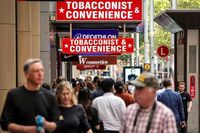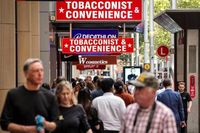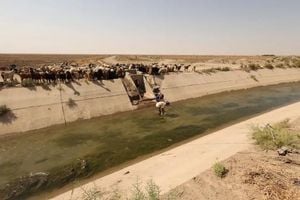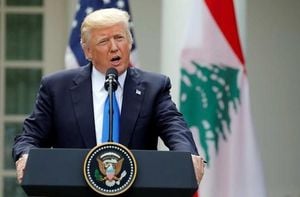Australia is currently facing a significant challenge as soaring cigarette prices are igniting what experts are calling a "tobacco war." This surge in prices is not only pushing many smokers toward the black market but is also depriving the government of billions in tax revenue. Reports indicate that the cost of a pack of 25 cigarettes has reached over $30, prompting a notable increase in illegal tobacco sales.
In March 2025, the Australian government, led by Treasurer Jim Chalmers, announced a reduction in its tobacco revenue forecasts by approximately $4.4 billion by 2029. Chalmers highlighted that many smokers are turning to smuggled products to avoid hefty indirect taxes on tobacco, which has led to a financial crisis within the public sector.
James Martin, a criminology professor at Deakin University in Melbourne, stated, "It is a financial crisis, as we lose millions of dollars in public fees. But what concerns me more is that it has become a major crime issue." The rise in illegal tobacco sales has also been accompanied by a disturbing spike in violence, with over 220 arson attacks targeting convenience store owners who refuse to sell unregulated tobacco products since the beginning of 2023.
Australia has long prided itself on being a leader in tobacco control, having introduced plain packaging for cigarettes back in 2012, making it the first country in the world to do so. However, the current situation has raised alarms among law enforcement and public health officials. Heather Cook, CEO of the Australian Criminal Intelligence Commission, noted that criminals are fighting for control of the lucrative illegal tobacco market, which is fueling violence and crime.
Martin elaborated that law enforcement alone cannot resolve this issue. He warned, "If we make access to nicotine more difficult, people will turn to the black market." He believes that the government has made two critical errors: firstly, by raising cigarette prices to a level where smoking a pack a day could cost around $9,500 annually, and secondly, by restricting the sale of e-cigarettes to pharmacies only.
To illustrate a potential solution, Martin pointed to New Zealand, which imposed a similar tax on tobacco but legalized e-cigarettes in 2020. He stated, "New Zealand's smoking rate was higher than ours just four years ago. Now, it is significantly lower than Australia's." This example suggests that a more balanced approach to tobacco regulation could yield better public health outcomes.
Smuggled cigarettes are reportedly making their way into Australia from China and the Middle East, while e-cigarettes are primarily imported from Shenzhen, China. The Australian Border Force has reported alarming figures, seizing 1.8 billion cigarettes and over 436 tons of illegal tobacco between July 2023 and June 2024.
Despite these challenges, smoking rates in Australia have declined significantly over the past few decades. In 1991, 24% of Australians aged 14 and older were smokers, a figure that has dropped to 8.3% by 2023, according to an annual survey. However, the consumption of nicotine per person has remained relatively stable since 2016, as indicated by research from the Australian Institute of Health. This study examined the presence of nicotine in wastewater, revealing its persistence in both traditional and electronic cigarettes.
Edward Jegausothi, a health expert, noted that the percentage of smokers in Australia has decreased by half, regardless of whether prices have stabilized or increased significantly. He commented, "The black market undermines public policy by providing cheaper alternatives," advocating for a reduction in tobacco taxes and increased police oversight.
Furthermore, Jegausothi pointed out that the current tax policies disproportionately affect lower socio-economic groups, who tend to spend a larger percentage of their income on tobacco products. Both he and Martin have recently published a scientific article warning that there is little evidence to support that the current war on nicotine is the ideal strategy to mitigate smoking-related harm.
The ongoing "tobacco war" in Australia has sparked a complex debate about the effectiveness of high taxation on tobacco products and its unintended consequences, particularly regarding public health and crime. As the government grapples with the balance between reducing smoking rates and combating the black market, experts are calling for a reevaluation of current policies to better address these intertwined issues.





